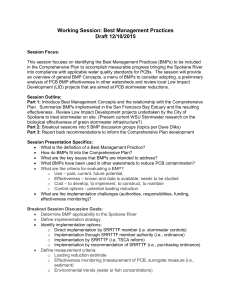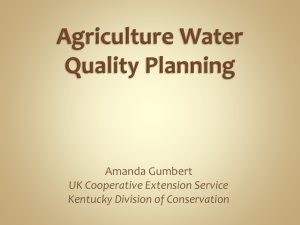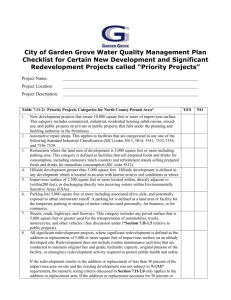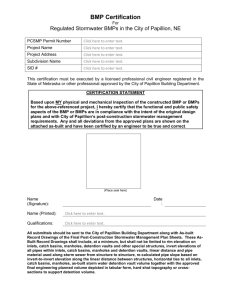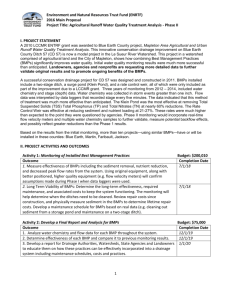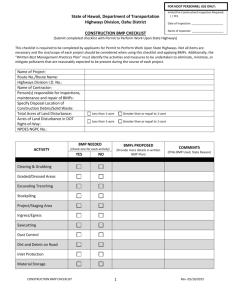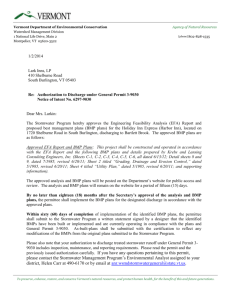Non-Priority Project Water Quailty Plan
advertisement
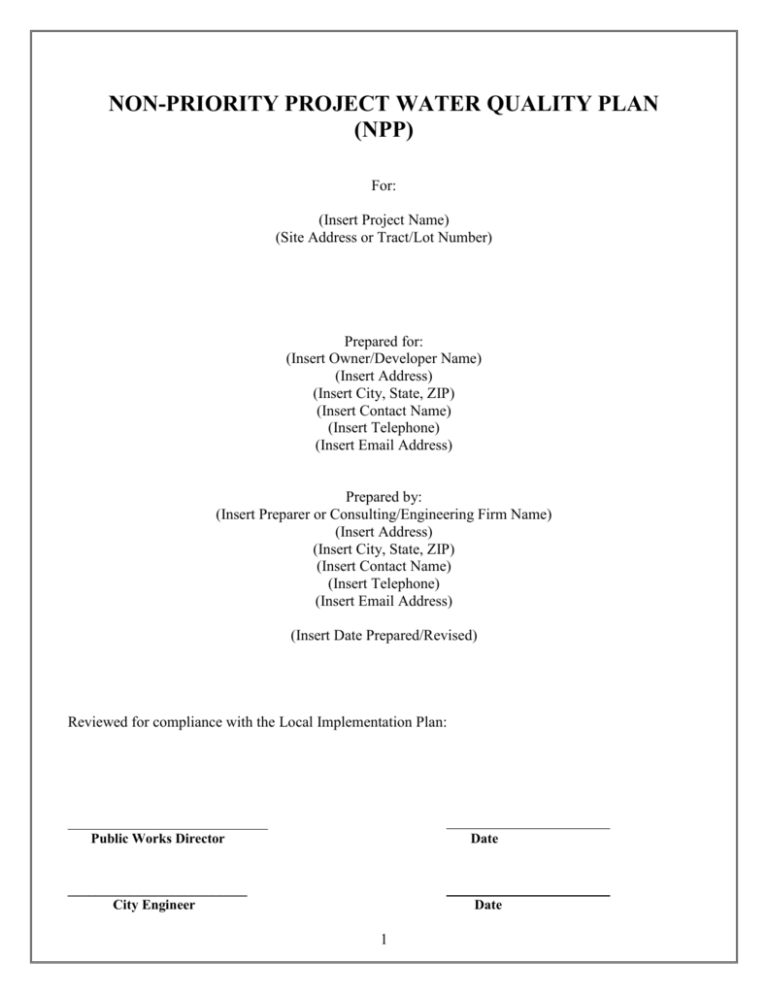
NON-PRIORITY PROJECT WATER QUALITY PLAN (NPP) For: (Insert Project Name) (Site Address or Tract/Lot Number) Prepared for: (Insert Owner/Developer Name) (Insert Address) (Insert City, State, ZIP) (Insert Contact Name) (Insert Telephone) (Insert Email Address) Prepared by: (Insert Preparer or Consulting/Engineering Firm Name) (Insert Address) (Insert City, State, ZIP) (Insert Contact Name) (Insert Telephone) (Insert Email Address) (Insert Date Prepared/Revised) Reviewed for compliance with the Local Implementation Plan: _____________________________ Public Works Director Date __________________________ City Engineer Date 1 Non-Priority Project Water Quality Plan (NPP) The Orange County Stormwater Program has developed this Non-Priority Project Water Quality Plan (NPP) for new development / significant redevelopment projects that do not meet the criteria for Priority Projects as defined within the County’s Model Water Quality Management Plan (see Model WQMP Sections 1.3 and 1.4) but that qualify as Non-Priority Projects as defined in the Drainage Area Management Plan (DAMP). These projects are required under the Santa Ana Regional Board MS4 Permit (North Orange County Permit) to “document, via a WQMP or similar mechanism, site design, source control and any other BMPs which may or may not include treatment control BMPs”. There is no similar requirement under the San Diego Regional Board MS4 Permit (South Orange County). This plan covers both private and public agency projects that qualify as Non-Priority Projects. Qualifying Non-Priority Projects are projects that do not fall under one of the Priority Project Categories defined within the Model WQMP but meet one of the following conditions: Require discretionary action that will include a precise plan of development, except for those projects exempted by the Water Quality Ordinance (as applicable); or Require issuance of a non-residential plumbing permit for hazardous pipelines as defined in the County or local Water Quality / Stormwater Ordinance. Non-residential plumbing projects that do not pose a potential threat to public safety do not require a WQMP for approval. A “discretionary action” under CEQA is defined as “an activity which requires the public agency to exercise judgment in deciding whether to approve or disapprove the particular activity, as distinguished from situations where the public agency merely has to determine whether there has been conformity with applicable ordinances or other laws.” (California Public Resources Code § 21080(a); CEQA Guidelines § 15357). Examples of discretionary actions include: feature plans, area plans, use permits, site development permits and special use permits. “Ministerial actions” under CEQA are those where little or no judgment or deliberation by a Permittee is required or possible. Generally, the only example of a ministerial approval action that would qualify as a Non-Priority Project would be a project that requires the issuance of a Non-Residential Plumbing Permit. All other projects and activities that only require a ministerial grading or building permit for which the Permittee has no discretion to approve do not fall under the requirements of this new development program, with the exception of projects that require a Non-Residential Plumbing Permit. This plan is provided for summarizing basic project information and stormwater Best Management Practices that are planned for controlling discharges of pollutants from proposed Non-Priority Projects and identify applicable source conrol BMPs, site design features, and determine BMP maintenance requirements. Non-Priority Project proponents are required to complete the plan for local jurisdiction review and approval. Applicable sections of the Technical Guidance Document are referenced for assistance with completing each NPP section. All Non-Priority Project Water Quality Plans must be in compliance with the Local Implementation Plan developed by each local agency. The local jurisdiction may request additional information necessary for local Non-Priority Project review and approval. Local jurisdictions may modify existing templates for local program implementation to incorporate the information contained in this Plan provided all information necessary to meet requirements contained in the MS4 Permit and the DAMP for Non-Priority Projects are contained within the local plan. 2 Non-Priority Project Water Quality Plan Contents Section I: General Information……………………….……………………………….. 3 Section II: Project Description……………………………………………………….... 5 Section III: Site Description……………………………………………………….……6 Section IV: Best Management Practices (BMPs)…………………...............................7 Section V: Inspection and Maintenance Responsibilities…………………………... 13 Section VI: Plot Plan…………………………………………………………….……. 14 References: Model WQMP Technical Guidance Document California BMP Handbooks 3 Non-Priority Project Water Quality Plan Section 1 – General Information See Technical Guidance Document Section 2.2.1 for additional information. Project Name Tract Lot APN Planning Area Prepared For: Owner/Developer Address Phone Fax Prepared by: Name Address Phone Email Fax Dates: Date Prepared Date(s) Revised Date Finalized 4 Owner’s Certification This Non-Priority Project Water Quality Plan has been prepared for: Owner/Developer Name By: Preparer’s Name The plan is intended to comply with the Non-Priority Project requirements of the Local Implementation Plan (LIP) §A-7.5.1 as required in the Orange County Drainage Management Plan (DAMP) § 7.6.2. The undersigned, while it owns the subject property, is responsible for the implementation of the provisions of this plan. Once the undersigned transfers its interests in the property, its successor-in-interest shall bear the aforementioned responsibility to implement the best management practices (BMP) described within this plan. A signed copy of this document shall be available on the subject property into perpetuity. Signed Name Title Company Address Phone Date 5 Section II: Project Description Please provide a detailed description of the project’s ownership, type of development project, amount of paved and landscaped area, and potential pollutants that may be generated by the intended development uses. See Technical Guidance Document Section 2.2 for additional information. Property Ownership Project Description Paved Areas Landscaped Areas Potential Stormwater Pollutants (see Technical Guidance Document Section 2.2.2) 6 Section III: Site Description See Technical Guidance Document Section 2.3 for additional information. Address Planning Area Land Use Zoning Acreage Predominant Soil Type Drainage Conditions Please provide site drainage details, including how site drainage ties into adjacent property drainage patterns, local storm drain systems, and downstream receiving waters. Pre-Project Pervious Conditions Area (acres or sq ft) Percentage Pervious Impervious Completed Project Pervious Conditions Area (acres or sq ft) Percentage Pervious Impervious Watershed Information Your local municipality stormwater program management staff may assist you with this information. Watershed Receiving Waters 303(d) Impairments TMDLs Known ESAs Known ASBSs 7 Section IV: Best Management Practices (BMPs) Site Design BMPs Site Design BMPs reduce the volume of stormwater runoff generated on a project site as well as improve the quality of runoff that leaves the site, and are required for all proposed Non-Priority new development and significant redevelopment projects. Descriptions of the most common Site Design BMPs are provided in County’s Technical Guidance Document (see Technical Guidance Document Sections 3 and 4). A list of typically employed Site Design BMPs may be found in the California BMP Handbooks (California Stormwater Quality Association). The following table provides a list of Site Design BMPs that may be applicable for Non-Priority Projects. Please identify each Site Design BMP included for the project, and briefly describe within the table. Site Design BMPs Name Check If Included Brief Description Hydrologic Source Controls Retention Grading Downspout Dispersion Downspout Infiltration Amended Soils Over Tight Underlying Soils Street Trees, Canopy Interception Residential Rain Barrels Not Actively Managed 8 Site Design BMPs (continued) Name Check If Included Brief Description Infiltration Bioretention without Underdrains Rain Gardens Porous Landscaping Infiltration Planters Retention Swales Infiltration Trenches Infiltration Basins Drywells Subsurface Infiltration Galleries French Drains Permeable Asphalt Permeable Concrete Permeable Concrete Pavers 9 Site Design BMPs (continued) Name Check If Included Brief Description Evapotranspiration Green Roofs, Brown Roofs, Blue Roofs Rainwater Harvesting Above-ground Rain Barrels Above-ground Cisterns Underground Tanks Biotreatment Bioretention with Underdrains Stormwater Planter Boxes with Underdrains Rain Gardens with Underdrains Constructed Wetlands Vegetated Swales Vegetated Filter Strips Compost-Amended Road Shoulders Proprietary (Ready-To-Install) Vegetated Biotreatment Systems 10 SOURCE CONTROL BMPs Source Control BMPs, both non-structural and structural, are required for Non-Priority Projects where applicable to project features. Please identify each applicable Source Control BMP within the following tables. See Technical Guidance Document Section 6 for additional information. Non-Structural Source Control BMPs Check One Identifier Name Included N1 Education for Property Owners, Tenants and Occupants N2 Activity Restrictions N3 Common Area Landscape Management (CASQA BMP Handbook SC-73) N4 BMP Maintenance N5 Title 22 CCR Compliance (How development will comply) N6 Local Industrial Permit Compliance N7 Spill Contingency Plan (CASQA BMP Handbook SC-11) N8 Underground Storage Tank Compliance N9 Hazardous Materials Disclosure Compliance N10 Uniform Fire Code Implementation N11 Common Area Litter Control (CASQA BMP Handbook SC-60) N12 Employee Training N13 Housekeeping of Loading Docks (BMP Handbook SD-31) N14 N15 N16 Common Area Catch Basin Inspection (BMP Handbook SC-74) Street Sweeping Private Streets and Parking Lots (CASQA BMP Handbook SC-43, SC-70) Commercial Vehicle Washing 11 Not Applicable Structural Source Control BMPs Check One Name (with CA BMP Handbook Reference) Included Storm Drain System Stenciling And Signage (SD-13) Outdoor Material Storage Area Controls(SD-34) Trash And Waste Storage Area Controls(SD-32) Efficient Irrigation Systems (SD-12) Slope And Channel Protection Loading Dock Area Controls(SD-31) Maintenance Bay Controls(SD-31) Vehicle Wash Area Controls(SD-33) Outdoor Processing Area Controls (SD-36) Equipment Wash Area Controls(SD-33) Fueling Area Controls (SD-30) Hillside Planting And Landscaping (SD-10) Wash Water Control For Food Preparation Areas Community Car Wash Racks 12 Not Applicable Source Control BMP Implementation Please describe implementation frequency and the party responsible for implementation of each Source Control BMP. Other BMPs Other BMPs or devices incorporated to remove pollutants from runoff leaving the project site, which may or may not include Treatment Control BMPs (see Technical Guidance Document Section 4.6), are not required for Non-Priority Projects though may be appropriate under certain conditions. Please provide details on any other BMPs selected for this project. 13 Section V: Inspection and Maintenance Responsibilities BMPs implemented for Non-Priority Projects must be inspected and maintained post-construction for proper effectiveness into perpetuity. Please document BMP inspection and maintenance information within the table below. See Technical Guidance Document Section 7 for additional information. BMP Inspection / Maintenance BMP Reponsible Party(s) Inspection / Maintenance Activities Required 14 Minimum Frequency of Activities Section VI: Plot Plan A plot plan must be provided that contains the following project features: Each facility and its intended function (if multiple facilities and uses are present onsite) Areas of outdoor activities (if applicable) Applicable Structural Source Control BMPs and any Treatment Control BMPs Drainage flow information Storm drain facilities Relationship between onsite drainage and offsite drainage The plot plan must contain the following labels: Title Block o Drainage Plot Plan o Project Name o Address o Owner o Label plot as “Section VI” Legend North Arrow Scale Project proponents should submit the plot plan with BMP details in electronic drawing or GIS format. 15
